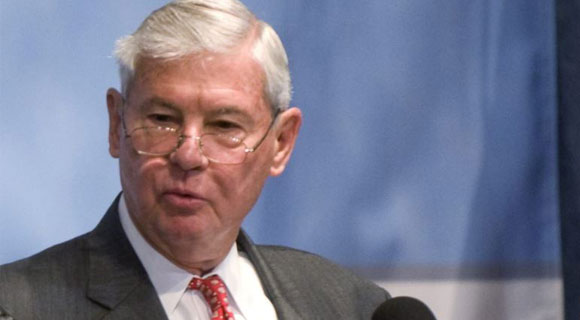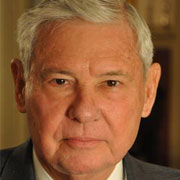Former Florida Governor and Senator Answers 5 Questions
By Margie Menzel, The News Service Of Florida // January 2, 2015
'Yes, we're still a democracy'

BREVARD COUNTY, FLORIDA – Bob Graham is one of the most-successful politicians in modern Florida history, serving two terms as governor and three terms in the U.S. Senate.
Now, his daughter Gwen is ready to take the oath of office Tuesday as she joins the U.S. House.
The two campaigned together throughout Northwest Florida last year, with the elder Graham, now 78, still a magnet for voters in his daughter’s 2nd Congressional District.
A Democrat, Bob Graham never lost an election, rising from a Miami Lakes state representative and state senator to governor in 1978.
During that campaign, he introduced what became a theme of his career: the workday, at which he performed the jobs of ordinary Floridians for a full eight hours. He has since performed hundreds, and Gwen Graham took up the practice during her campaign.
In Washington, Bob Graham was chairman of the Senate Select Committee on Intelligence.
After leaving the Senate in early 2005, he authored the book “Intelligence Matters,” about what he saw as serious flaws in the U.S. national security system.He also founded the Bob Graham Center for Public Service at the University of Florida, his alma mater.
The News Service of Florida has five questions for Bob Graham:

Q: Gwen says you were the first one to tell her she’d been elected.
GRAHAM: On Election Night, we were all at what I still refer to as the round Holiday Inn (in Tallahassee), although I know the name of it is changed now. And most of the people were in a larger room on the 12th floor, and those of us who were following the detailed election results were in a smaller room on the 11th floor.
We knew that the votes that would come in between 7 p.m. and 8 p.m. would be tilted towards Gwen, because those would include the votes from places like Leon and Jefferson and Gadsden counties.
The question was, would she have enough of a lead to sustain the after-8 o’clock Eastern, the Central … time votes which would be coming in shortly? And as the hour between 8 o’clock and 9:30 moved forward, the margin kept getting slimmer and slimmer until finally it was down to around 2,600 votes or so, and it was announced that all the votes had been counted. And that was when the (Associated Press) announced that she had won.
So I figured that with those two pieces of information, we were safe to say she’d been elected, and I went upstairs and told her, “Gwen, you’re the next — and first — congresswoman.”
Q: You seemed to be having the time of your life in that campaign.
GRAHAM: I was having a great time. It’s wonderful to be able to watch your children perform at something that you are interested in. With four daughters, I never had a chance to watch Little League baseball games or things such as that, where you might see your son perform. But this was even better.
(She’s a talented politician.) Oh, yes, she’s really phenomenal. And she got progressively better as the campaign went on. Some candidates run out of gas before they get to the finish line. She was inhaling large volumes of oxygen and getting stronger and better as she got to the finish line. Ran right through it.
Q: But can she, as a freshman in a shrinking Democratic minority, make a difference in this political climate?
GRAHAM: Yes. There are three ways, basically, that a congressperson can make a difference, particularly in the lives of their constituents.
The first is the one that you learn in civics class, which is how a bill becomes a law.
Now the fact is, there aren’t very many bills being passed, whatever their sponsorship is. I think this Congress was one of if not the lowest number of bills passed in modern congressional history. I don’t think she is going to have a lot of legislation with her name on it enacted in the next two years.
I think, however, the way she is going to be approaching that part of her responsibilities, which is to be careful in the selection of her committees, build relationships across party and regional lines, look for those things that will have the most positive impact on the 2nd Congressional District, and be a strong and effective supporter.
The second way that a congressperson can be beneficial to their constituents is working with executive agencies.
Agencies like the (U.S. Army) Corps of Engineers will make many decisions over the next two years that will have an impact on the lives of people in the 2nd Congressional District.
I know one of her intentions is to develop a good personal relationship with the people in the Corps of Engineers who are most involved in decisions that will relate to the 2nd Congressional District, and through that, hopefully, be able to interest those executive agencies in the concerns of her constituents, and have that interest then be reflected in positive action.
The third way is individual constituents. The federal government is a complicated organization, and the average person finds it hard to maneuver.
If they’ve got a problem, whether it’s with the Veterans Administration or Social Security or the Small Business Administration, she’s going to put a strong emphasis on constituent services so that she can help her people achieve their objective by assisting their navigation through the complexities of federal agencies and programs.
Q: Can she really bring in the money for economic development — such as infrastructure and job training programs — that she made key points of her campaign?
GRAHAM: It’s not going to be easy, but yes, I think that by paying close attention. …
First, by having a good understanding of the resources, the positive aspects, for economic development in the district, and second by understanding what some of the challenges are.
And then by looking for opportunities to take advantage of the assets and reduce the liabilities for economic development in the area, I think that she can play a role in working with the local communities and the state in increasing the economic opportunities for people in the Panhandle.
Q: Politics has changed enormously since you retired. Money is much more dominant — are we still a democracy?
GRAHAM: Yes, we’re still a democracy, but I am concerned about some of the developments which had started when I was still in office that have significantly accelerated since I left.
And the most noticeable of those is just the sheer money that it takes to be an effective candidate. Gwen spent about $3.5 million on her campaign.
When I ran for the Senate in 1986 for the whole state, I think I spent something like $6 (million) or $7 million. That just shows the dramatic increase in the cost of campaigning.
I hope the Congress will pay attention to that, because failure to do so does run the risk that people will begin to feel that their elected officials are not responsible to them, but rather to the interests that finance their campaigns, and there will be an erosion of respect for our democratic institutions.













